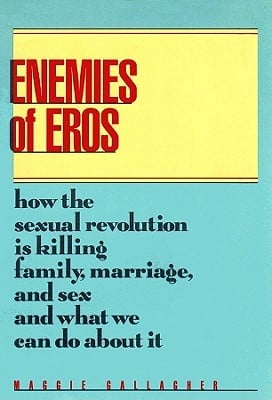Betty Friedan launched The Feminine Mystique on an unsuspecting world over a quarter of a century ago, and life, as it turns out, has never been the same since. To explain the soul-depleting misery and sense of purposelessness she claimed for modern, middle-class American house wives, Friedan concocted a theory of male conspiracy, a conspiracy that was keeping women in domestic bondage, slaves to reproduction and the material needs of men.
The book, of course, was only the opening salvo in what has become a decades-long war by feminist theorists against the order of things. What be gan as a rant against housework and car-pooling has by now become a social and political obsession with “women’s issues,” which seem to en compass, as the terms of this acrimonious debate have been articulated, everything from babysitting to the his tory of Western civilization. And how ever one might wish it otherwise, all women have been profoundly affected by these controversies.
Among other things, The Feminine Mystique and the flood of like-minded theorizing that came after it held out career success as the sine qua non of a meaningful life. It was from husbands and children that women most urgently needed to be liberated, or at least from the endless demands these creatures made on a woman’s days.
To be sure, movement “moderates” claimed to be calling only for a more equitable distribution of time-consuming drudgeries and practical entanglements, for a fairness that would allow women to escape the constraints of mere biology. The radicals, however, saw clearly to the heart of the matter and early on began to clamor for nothing less than a fundamental re structuring of society. They demanded, in short, a world in which all distinctions between men and women would be swept away. For only in a world where women were not obligated to care for their own children, that is, to nurture the future generation, could their full potential as “persons” be realized.
As Maggie Gallagher points out in Enemies of Eros, contemporary feminism, a set of elitist doctrines by and for upper-middle-class women, is precisely an idealization of androgyny. Ostensibly, the call for the obliteration of gender-determined roles means to in sure women their full measure of human dignity as high achievers in the world of work. But Gallagher recognizes that women cannot deny their own sexual natures without in fact doing ineluctable violence to themselves.
In an argument that is passionate to the point of being overwrought, Gallagher argues that feminism has succeeded in nothing so well as in the devaluation of women and the work that it is given to them by nature itself to do. It is motherhood itself against which feminist ideology rebels; in defining the mothering of children as a form of oppression well beneath the aspirations of intelligent, ambitious “persons,” feminists have struck to the core of civilized society, which begins in and flowers from the love between a mother and her child.
Indebted to George Gilder and his theories about the power of women as wives and mothers to tame male aggression and to harness it to the engine of social survival and growth, Gallagher argues that feminist assaults on the traditional family have ushered in an era of widespread abandonment of children by their fathers and the consequent impoverishment of women and children. By viewing motherhood as a matter of free and hence avoidable choice, feminism has freed men from their obligations as providers, and has precipitated an unprecedented wave of male violence against women, children, and each other. Moreover, denigration of married and family life has resulted in a generation of children left to the mercies of inadequate and sometimes damaging day-care arrangements, divorce, and abortion.
At the heart of all this, according to Gallagher, is the presumption that in our enlightened age we have somehow transcended the bonds of nature and have become free to shape our own destinies. Claiming sexual as well as every other form of satisfaction as a matter of right, we have tried to sever sex from procreation, transforming it into a voluntary pursuit of pleasure. But as Gallagher notes, “sex is a living pathway of connection, an intricate web of desire that begins with lust and ends not with orgasm but with children, families, communities, and nations. That ends, in fact, with love.” In other words, that which makes us most fully human is also that which keeps us most intricately enmeshed in a web of duties and entailments in the future.
There is much in Enemies of Eros that can serve as a necessary corrective to all that is misguided in contemporary notions about women, men, and the rest of it. Unfortunately, what wisdom there is in this book is submerged in a view of the world that is in its own way as intemperate and monomaniacal as the ideology the author is challenging. Moreover, Gallagher has in common with her enemies the same aggrieved sense of having been done wrong, however differently, by a culture that does not validate her values. And if there is one thing a weary world does not need at this point, it is another diatribe about woman as victim, which is what Gallagher, however well meaningly, finally serves up.
[Enemies of Eros, by Maggie Gallagher (Chicago: Bonus Books) 283 pp., $18.90]

Leave a Reply